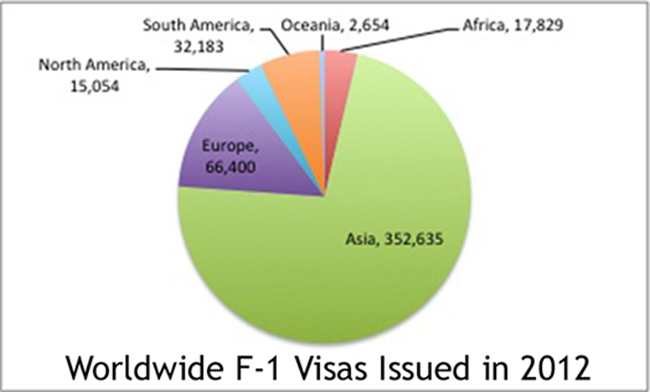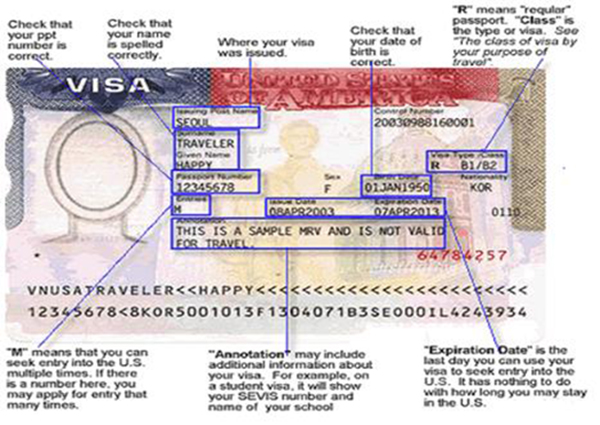
Mackenzie Allen/MEDILL The vast majority, 72 percent, of student visas were issued to students in Asia. Less than 1 percent were to students from Oceania. Information compiled from U.S. State Department databases.

U.S. Department of State website
U.S. officials are scrutinizing student visa holders to ensure compliance, but the director of an international student program says that it likely won’t impact foreign exchange students.
Last week, the Department of Homeland Security requested that border agents verify “effective immediately” that every international student entering the country has a valid visa, according to an internal memorandum obtained by The Associated Press on Friday.
This decision came after it was discovered that a friend of suspected Boston Marathon bomber Dzhokhar Tsarnaev had re-entered the country on an expired student visa.
Last year more than 500,000 student visas were issued by the U.S. Department of State.
“DHS is reforming the student visa system to ensure that [Customs and Border Protection] is provided with real time updates on all relevant student visa information,” the agency said in a statement.
Ravi Shankar, director of Northwestern University’s International Office, thinks that some of these announcements have been blown out of proportion.
“What you’re reading in the press is just the Custom and Border Protection people actually just beefing up their own current regulations,” Shankar said. “There have been no new rules or regulations issued. There is nothing new about this.”
“Whatever happened in Boston I think was just an oversight of a CBP official.”
There are two primary types of student visas, F-1 visas and J-1 visas. To qualify for an F-1 visa a student must be self-sponsored, while a J-1 visa is for students whose education is sponsored by a private organization or a government.
Northwestern University is home to 3,000 students with F-1 or J-1 visas.
Grace Kim, a South Korean who grew up in India, first entered the United States on an F-1 visa in 2006 to attend a university in New York. She lists the “room to explore” offered by American schools as her reason for seeking education here.
Kim has traveled abroad and re-entered the U.S. roughly a dozen times without hassle. She in part credits that to being a citizen of an American ally country.
“In light of September 11, a lot of Muslim students are profiled — they have difficulty coming back sometimes or when they do, they go through hours and hours of interrogation,” Kim said.
As part of the visa application process Kim, 26, took part in an interview at the U.S. Embassy in New Delhi — a process she described as the most difficult part of getting a visa.
“It really depends on who your visa interviewing officer is,” Kim said. “Some are really rough and make your life a living hell. It’s kind of nerve-racking, the way you answer a question and your opportunity to study in the United States can no longer be possible.”
Kim said that the two most important things during the interview are being able to prove that you have the finances to pay for school and that you intend on returning to your home country when the program concludes.
Rather than return home, Kim chose to accept a work visa after graduation through the Optional Practical Training program, OPT, that allows international students to use their skills in country.
If a student stops complying with the rules of their visa it is up to their school to report that information to the Student Exchange Visitor Program, a branch of DHS.
“In the event that there is a violation of status, say a student stops attending classes or drops below full time, we are obligated to report to SEVP within 20 days,” Shankar said. “Suffice it to say, most of our students are fine.”
If a student is found in violation they are responsible for addressing the issue through DHS.
If a student visa is terminated based on failure to enroll or dismissal from a school, students have generally been given 30 days to correct the situation, officials say. If a student has no criminal history or other derogatory information, then they typically do not present a priority case for Homeland Security.
The official also said that DHS has been looking to update its system for several months.
“I think by the end of the month, certainly, we probably will have a technological solution to this particular issue,” Homeland Security Secretary Janet Napolitano was quoted as saying by Politico. “One of the things that we are doing now is checking manually the most recent student visa information because … it changes all the time, students add, students drop, etc., with customs information, which is held in a different place.”
Kim doubts that additional measures will deter people from entering the country — peacefully or otherwise.
“If it’s like an extra hour in line or extra paper work, I would still do it,” Kim said. “On the other hand, would I think adding scrutiny to people whose visas have expired will prevent terrorists from attacking America again? No.”





